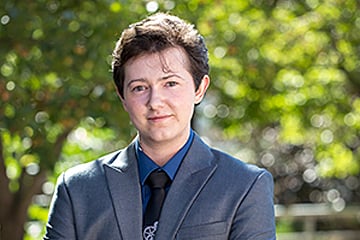
The University of Calgary is no longer the only common-law school in Canada without an OUTLaw chapter.

The University of Calgary is no longer the only common-law school in Canada without an OUTLaw chapter.
“The first year I taught tax I started using examples of same sex couples in the practice problems for tax questions — if I was talking about a spousal or common law relationship I might use same sex partners — and I got really positive feedback on that in my evaluations so our students seemed to respond well to LGBT content in the curriculum,” says Saul Templeton, assistant professor at the university. “I kind of wondered what’s going on, why don’t we have a group?”
The issue culminated for Templeton when a friend he attended Osgoode Law School with sent him the letter that OUTLaw, a network specifically for LGBTQ+ law students with chapters across North America, was sending to the minister of justice about Trinity Western University’s attempt to accredit its law school.
“All the chapters of OUTLaw were on it and U of C was noticeably absent so I thought OK, I have to get the students to do something about this.”
Templeton organized a mixer between law, medicine and vet med — medicine has “a really active LGBT caucus” at the university, he notes — which happened in early February and is to be an annual event. Through organizing that,
Templeton talked to the law students and encouraged them to start one of these groups.
Though U Calgary law has had student initiatives promoting diversity and inclusion on campus and in the legal profession — including a student club launched in 2015, Diversity & Law Society, that focuses on multiculturalism but,
Templeton notes, was very good at making space for LBGTQ+ students as well, and won Lexpert’s Zenith award last year — students and faculty welcome an LGBTQ+ group.
Founder and president of OUTLaw, third-year law student Holly Wong, said in the news release on the university’s website that she “recognized the need and benefits of such an initiative, for not only LGBTQ+ students, but the law student community and general profession.”
Templeton credits her with doing much of the legwork needed to set up the group, which currently has 30 members. She networked with an articling student and got them to help draft the constitution for the chapter, she figured out how to get it registered with the student union and she recruited many of the executives.
Wong said the response to the group was impressive, and everyone involved is excited to hit the ground running when school starts on Tuesday.
“As we started the process to start the club, other law students quickly caught wind of it and were eager to volunteer their time and resources,” she said in the release.
The launch of the chapter comes just in time for the group to participate in Calgary’s annual Pride Festival, which runs through to Sept. 4. The OUTLaw chapter will march in the parade Sept. 3, and Templeton says it’s “great we’re going to be an actual visible presence” this year.
“We’ll probably have at least 15 people representing law which is great because last year was the first year U of C Law marched in the pride parade and there were only six people and I thought, well no wonder, if we don’t have a chapter of OUTLaw it doesn’t look like we are institutionally supporting the students. That’s one reason I thought it was so important.”
The students in the group are also working on organizing a careers panel that focuses on “surviving as LGBTQ in the law,” Templeton adds.
Over his time teaching at U of C, he’s had students approach him with questions like, should they be out in the interview process? Or if the person and their partner are invited to a firm event, and their partner is a same sex person, should they bring them?
“And I thought well I’m the tax prof — things are pretty bad if you’re asking for life advice from your tax prof,” Templeton laughs.
His experience fielding these queries make him very excited to see the panel. The students have also been networking with lawyers in the private bar and with the executives at the Alberta chapter of SOGIC, the Sexual Orientation and Gender Identity Community section of the Canadian Bar Association.
“They’ve already got a base of lawyers who are really excited to see this happen at U of C and also really excited to get involved and offer mentorships and offer different perspectives on not just getting a job if you’re LGBT in the law, but also how to navigate work politics once you’re there,” Templeton says.
Student members of OUTLaw will also be offering legal clinics and information sessions at Calgary’s Outlink, a community hub that provides peer support, resources and information to LGBTQ+ people in the Calgary area.
In Canada, the OUTLaw chapters came together with other like-minded groups and successfully applied for intervener status in the Trinity Western University case, which is heading to the Supreme Court of Canada over the Christian university’s application for accreditation of its law school.